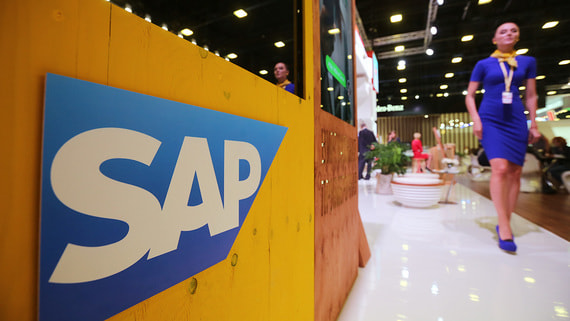
As per the statement from the German conglomerate, SAP is making a comeback in the Russian market, albeit with limitations. Two years ago, SAP withdrew from the Russian market with the involvement of the German government. Now, it has been given authorization to re-enter. SAP has been consistently enforcing new anti-Russian sanctions over the past two years.
Complete turnaround
SAP, the multinational corporation renowned for its CRM systems (customer relationship management) and ERP systems (enterprise resource planning), is set to officially reestablish its presence in the Russian market. The Federal Office of Economics and Export Control of Germany (BAFA) has greenlit this decision. However, this reinstatement comes with a caveat as SAP is maintaining some of the previously imposed sanctions on Russians and Russian entities – meaning that most companies operating in Russia will not be able to resume partnerships with SAP.
Reportedly, European companies’ Russian branches are primarily permitted to utilize SAP software developments in Russia. Similarly, the diplomatic and consular missions of the European Union in Russia have been granted similar privileges – with no blanket permission for others.
Moreover, there are temporary constraints – EU diplomatic bodies and Russian subsidiaries of European companies have authorization to use SAP software until March 31, 2025 at the latest.
Delicate complexities
The exemptions outlined in the BAFA ruling still impact local companies, albeit with conditions. This authorization is exclusively extended to Russian businesses’ branches registered in Switzerland and the European Union.

This reentry of SAP is unlikely to be comprehensive
Despite that, not everyone will be able to purchase a SAP software license or access technical assistance. Only companies registered in Germany, German citizens or residents will be authorized to sell them, as per the publication. The BAFA document’s provisions pertain not just to the selling of German SAP software, but also its distribution, transfer, export, and the provision of associated services.
Nevertheless, even with the stringent restrictions on license issuance and technical support for SAP in Russia, numerous companies are anticipated to acquire them. As per predictions from a source cited by the publication, thousands of companies will meet the criteria.
Reliance on imports
SAP has a longstanding presence in the Russian ERP and CRM systems market, having launched its Russian branch over 30 years ago, in 1992, and securing a significant market share since. Anton Pavlenko, Director of Computing Systems, Service, and Outsourcing at Jet Infosystems, highlighted that by the end of 2021, while the country was yet to confront current circumstances, around 45% of Russian companies were using SAP software. In the realm of large enterprises, this figure soared to 60%.
In March 2022, according to a report by CNews, SAP made the choice to exit Russia, but faced delays in executing its strategies. The final action by SAP seemed to materialize by the end of 2023 when it ceased providing technical support to its customers in Russia, however, this turned out to be just a momentary pause. It was in February 2024 when SAP also opted to separate Russian users from its cloud services.
Despite these measures, the count of Russian enterprises utilizing SAP solutions surpasses the mere hundreds – reaching into the thousands. As per the estimations made by Alexey Izosimov, the technical director of T1 Integration, approximately 2,000 companies are presently utilizing these solutions in the country. He shared that among them are prominent entities such as Gazprom, Russian Railways, Aeroflot, Sberbank, X5 Group, M.Video-Eldorado, and others.
The departure of SAP from Russia left a substantial financial impact. Data from “Contour.Focus” indicates that by the end of 2021, the Russian branch of SAP, SAP CIS LLC, garnered revenues around 36.7 billion rubles and a net profit of 2.1 billion rubles. However, in 2022, the figures starkly contrasted with revenue falling to 16.3 billion rubles and incurring a net loss of 8.4 billion rubles. The financial performance for 2023 remains undisclosed.
Moreover, SAP suffered a loss of 410 million euros due to its exit from Russia. As mentioned by CNews, this sum was allocated for the restructuring of its business operations.
The gradual shift towards alternative software solutions
Towards the end of 2023, nearly two years after SAP’s announcement to withdraw from Russia, only a limited number of local enterprises made the switch to SAP software alternatives. T1 Integration approximates that around 15-20% had transitioned by that time. Notably, in sectors such as mining, oil and gas, and metallurgy, 60% of Russian enterprises continue to rely on SAP products. A similar trend is observed in the sphere of mechanical engineering. The publication consulted experts who expressed skepticism regarding the potential impact of the new BAFA initiative. Ilya Zharsky, the managing partner of the Veta expert group, stated that the general permit under the initiative does not signify a revolutionary step in eliminating restrictions but rather streamlines processes for officials and organizations engaged in service and software provision. Pavel Kirik, managing director of the Axenix Platform Solutions department, characterized the BAFA decision as an effort to restore equilibrium after SAP’s exit, highlighting the ongoing challenges faced by international company offices in adapting to new software landscapes.
Anticipating a forthcoming replacement solution
Looking ahead, there is optimism that a homegrown substitute for SAP’s core software offerings may emerge in Russia. Specialized individuals with substantial experience working with German software from the Russian SAP office are actively involved in this initiative. They have joined the technical support team at Lab SP to develop a comprehensive replacement for German vendor products, including CRM and ERP systems. Lab SP aims to present both systems in a minimally viable product (MVP) state by the end of 2024. However, achieving this goal within a short timeframe will necessitate considerable financial investments, projected to be in the range of several hundred million rubles.



[…] SAP unexpectedly comes back to Russia despite sanctions and intimidation of Russians […]